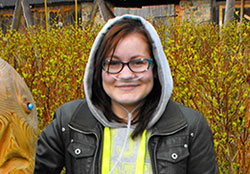Latvia: Līva Brizga

Līva Brizga
Health experience related to: pulmonary hypertension
Physician-provided information on services to help people manage their health improves their capacities to cope with disease psychologically, as well as physically.
I have a genetic disease called cystic fibrosis. I have to use medicine every day to keep my condition more or less stable so that I can move, walk, talk, breathe and do the things that normal people do.
After graduating from high school, I moved to Liepaja and started my studies. I thought that being close to the Baltic Sea and breathing fresh air would help my health condition. But it got worse and worse. I felt that I should be looking for causes other than cystic fibrosis.
One day while I was waiting for the bus, I noticed a poster. The face of the woman in the poster seemed to be sad; her lips were kind of blue and there were some descriptions of symptoms. I asked myself – do I feel the same? Do I have these symptoms? I had noticed that my lips were a bit blue as well, especially when I get tired at work or if I have had a lot of things to do. I understood that I should check whether I have the disease shown in the poster: pulmonary hypertension.
When I came home, I searched for information on the internet about pulmonary hypertension. I knew that my symptoms were respiratory failure, high blood pressure and physical failure, which made it hard for me to do anything. On my next visit to the family doctor, I decided to ask her to give me a referral to test for this disease.
My doctor was surprised and, at the same time, pleased that I notice campaigns like the one with blue-lipped women. Usually people notice posters with discount products on them, but not ones with information about health. But I noticed, because I was worried about my health at that moment. The doctor referred me to a cardiologist, 1 of the only 2 specialists in Latvia who treat patients with pulmonary hypertension.
The cardiologist talks to patients like people; he understands their wishes, problems, difficulties and needs. He has a great attitude and communication skills. You go to him as a friend – to share information and experience, and to find the best solution – and not just to get a prescription. I think that it is really important.
Pulmonary hypertension is a rare disease and in Latvia, there is no uniform compensation scheme for all patients. The cardiologist helped me write an application to the National Health Service to see whether I could get my treatment paid by the Government. They gave me a positive answer within a month and I got my medicine.
Although I have to write this application every year and the Government approves or rejects compensation for every twelve-month period, it is worth it. Even though you see that this medicine is not on the list of compensated medicines, the Government is trying to find a solution for every case.
I also got information from the cardiologist about how to contact the patient society, which helps and supports people with pulmonary hypertension. I can go to the Association of Pulmonary Hypertension as well if I have questions about everyday situations, such as how to live and help myself, and what kind of help I can get from the Government – not exactly the kind of questions I should be asking my doctor. That was really good advice. I am glad that medics work together with nongovernmental organizations that support patient interests. It means a lot – not only to talk about the medical side or to do exercises but also to get emotional support from other patients.
I really like that nongovernmental organizations have more and more influence, which helps people get more interested in their health and not only by doing internet searches and going to doctors.



